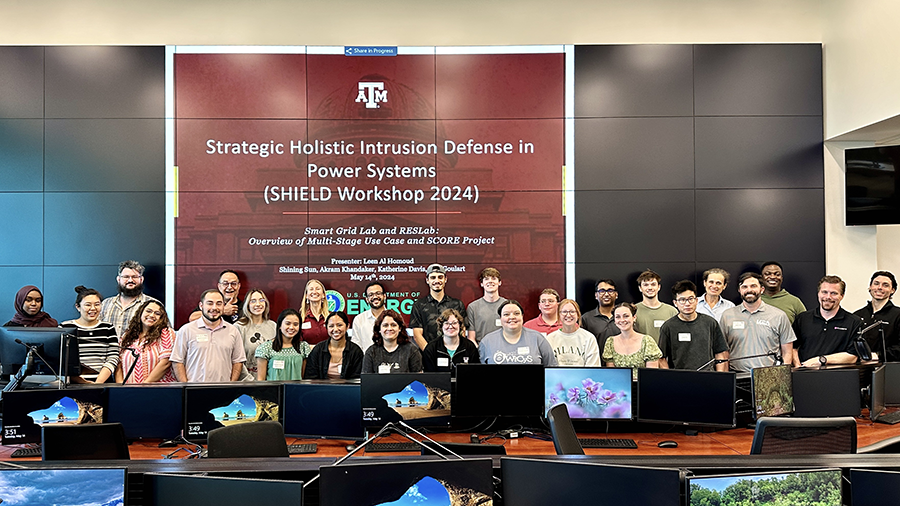Computer Science
Tech computer science students forge interdisciplinary bonds at SHIELD workshop

Collaboration is key.
That’s what eight Tennessee Tech computer science majors learned, along with students from other engineering disciplines, at the second annual Strategic Holistic Intrusion Defense in Power Systems workshop held May 13-14 at Texas A&M University’s Center for Infrastructure Renewal.
“This workshop was attended by electrical and computer engineering students with expertise in electrical power systems and computer science students with expertise in cybersecurity, data science and artificial intelligence,” said Muhammad Ismail, associate professor of computer science at Tennessee Tech, who led the workshop with TAMU’s Kate Davis, associate professor of electrical and computer engineering.
Thirty-five students from Tech and TAMU participated in the workshop, the second of three being offered as part of a National Science Foundation research project known as SHIELD, which stands for Strategic Holistic Framework for Intrusion Prevention Using Multi-Model Data in Power Systems. It is funded by the NSF’s Energy Power Control Networks program.
Ismail, principal investigator of the grant, said the primary goal of the workshop was for students to familiarize themselves with each other’s terminologies and recognize how their respective areas of expertise converge to ensure security and efficiency of critical infrastructure.
“We are aiming to create new professionals who are experts in power systems, cybersecurity and artificial intelligence,” he said.
Students delved into numerous sessions on both normal and abnormal cyber-physical power system operations, including one led by Ismail on machine learning and artificial intelligence for anomaly detection and defense.
“This session introduced students to how AI techniques can be leveraged to secure the power system,” he said. “We started by teaching them about machine learning with supervised and unsupervised learning techniques. We focused on deep learning strategies based on neural networks such as feedforward, recurrent, convolutional and graph neural networks and autoencoders.”
Students then learned how to set up a testbed, launch cyberattacks, collect datasets and develop intrusion detection systems (IDSs) based on deep learning techniques.
“IDSs can detect whether the power system is under cyberattack so response strategies can be invoked,” he said. “I shared Python codes with students to teach them how to develop and test the IDSs.”
Tennessee Tech senior Brett Billingsley, who has a concentration in cybersecurity, said the workshop was impactful.
“I was interested in getting more familiar with the way the operational technology (OT) systems on site work and communicate with the information technology (IT) systems in the control center,” he said. “With knowing the information and data flow through all these systems, it becomes much easier to segment the network and prevent attacks from happening.”
The knowledge he gained will come in handy during his summer internship.
“I will be going to Oak Ridge National Laboratory and working on their testbed and the power system,” he said. “I also learned about incident response dealing with ICS (industrial control system) and how to approach an incident to figure out what happened.”
Also attending from Tennessee Tech were undergraduates Kelsey Rainey, Kaleigh Hooper, Jamie Boyd, Warren Proctor, Kashaina Nucum, Liezl Laurel and graduate student Marlana Hatcher. Their participation was funded by NSF’s SHIELD and CyberCorps Scholarship for Service grants.
The workshop’s instructional team also included Ana Goulart, associate professor of engineering technology and industrial distribution, TAMU; John Romero program director, outreach and continuing education, Texas A&M Cybersecurity Center; Justin Leiden, program director, O.T. engineering and cybersecurity, Texas A&M Cybersecurity Center; Erik Keller, research engineer, TAMU; Akram Hague and Leen Al Homoud, graduate students, TAMU; Daniel Marr, P.E., director, SOCC Operations, LCRA; Ben Sterling, technologist, Claroty; and Edmond Rogers, lead operational technology security engineer, University of Illinois Urbana-Champaign.
What other opportunities are coming up for Tech students through SHIELD?
“Currently, the SHIELD grant is providing scholarship to one Ph.D. student, and a second will be joining in the fall,” Ismail said, adding that he has hired one student worker and plans to add more.
Next summer, scholarships will be awarded to five to eight undergraduate students to attend SHIELD’s third annual student workshop at TAMU.
“This is a great opportunity for our students to learn about a highly interdisciplinary field and interface with their peers at Texas A&M University,” Ismail said.
Computer science is one of the largest and fastest-growing programs in Tennessee Tech’s College of Engineering. Concentration options include data science and artificial intelligence; information assurance and cybersecurity; and high-performance computing. Learn more at www.tntech.edu/csc.
Lean More About Our Programs

